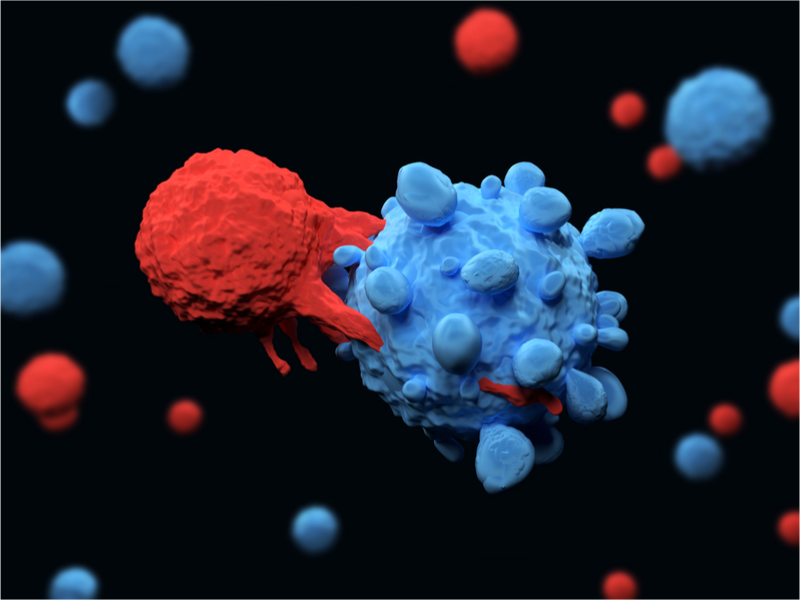Scientists grow a universal army of T-lymphocytes to destroy cancer
- Transfer

Scientists from the University of California, Los Angeles have managed to turn iPSC into adult T cells that mature in our thymus and patrol the body to destroy cancer and other diseases.The work, published in Cell Stem Cell, was led by Gay Crookes, MD, professor of pathology and laboratory medicine and pediatrics. Dr. Crookes is co-director of Eli and Edith Broad of the Center for Regenerative Medicine and the Center for the Study of Stem Cells at UCLA.
An army of T lymphocytes to destroy cancer
T cells are usually produced by the bone marrow and mature in the thymus , a small organ located behind the sternum, which sends them into the body to patrol and destroy cancer and infection. The thymus begins to decline very early in life and trains a continuously decreasing number of T cells as we age. Reducing it is known as involution, and the aging of the immune system is the reason that we become vulnerable to disease.
As described in a new publication, Dr. Crookes and her team at UC used artificial thymus organoids, small organ-like structures that mimic the thymus, to grow and train human T cells. The group uses these organoids to grow mature T cells from iPSC. Organoids can grow a self-renewing supply of T cells, just like the thymus in your body.Pluripotent stem cells or iPSC are cells that can turn into any cell in the body with the right signals, and we learned how to grow them back in 2007 using cell reprogramming.
The ability to grow an unlimited army of T cells is important in the fight against cancer, especially with the help of immunotherapy , and can also be used in the fight against infections, including HIV, CMV and autoimmune diseases.
Immune therapies, such as CAR T , have shown great potential in the treatment of cancer; but they are currently very complex. You need to take the T cells from the patient, change them and insert a new receptor into them to help them detect cancer cells, and return them to the human body.
Unfortunately, the effectiveness of altered T cells is sometimes small. Another problem with therapies such as CAR T is their price, as such therapy should be personalized to the patient. Cancer patients may also lack T cells to take samples.
All of these factors severely limit the effectiveness of T cell immunotherapy. This new technique can potentially change everything.
Scientists have been working on it for several years and previously showed that they can grow mature T cells in artificial thymus organoids using blood stem cells. At that time, they hypothesized that they could achieve the same results using iPSC, and their new work showed it.
Scientists have shown that artificial thymus organoids can use both embryonic stem cells - ESC and iPSC, two types of pluripotent stem cells used in bioengineering. IPSCs are the easiest stem cells to get, as they can be easily obtained from adult skin or blood cells.
Scientists were also able to genetically modify iPSC to express a cancer-targeted T cell receptor. In combination with artificial thymus organoids, they obtained T cells capable of detecting and destroying specific tumors in mice. The plan was to grow genetically modified iPSC lines, which can then be programmed into tumor-specific T cells.
Many cancer cells shun T cells by tricking and hiding them. These tumor-specific stem cell lines can be obtained in unlimited quantities, and from them you can get a whole army of T cells that seek and destroy cancer, regardless of how it tries to hide.
Last hurdle
Although this is good news for immunotherapy, there is still an obstacle that needs to be overcome. T cells grown using this technique have marker molecules on their membranes that can trigger an immune response.
The next step for scientists will be the cultivation of human T cells, which have receptors that recognize cancer, but are devoid of molecules that trigger an immune response. These cell lines can be obtained in unlimited quantities and used in immunotherapy.
This technique will allow you to grow an unlimited number of T cells without the need to extract them from any source, and it does not require changes to avoid an immune reaction. This would be a huge breakthrough in immunotherapy, and such treatment would be cost-effective. It is easy to imagine universal T-cell methods for treating cancer and many other diseases in the near future.
Conclusion
Having an unlimited number of universal T cells capable of fighting cancer could help win the war, and scientists seem to be approaching this goal. The use of altered immune cells in the destruction of cancer is the final decision in the war, and we are enthusiastically looking at its advantages compared to such methods as chemotherapy or radiation therapy, which are rude and cause considerable harm to the patient.
In terms of anti-aging, such massive T-cell growth can also be used to rejuvenate the immune system.
We live in an exciting age of regenerative medicine, and the techniques we will receive soon will forever change our treatment for diseases.
